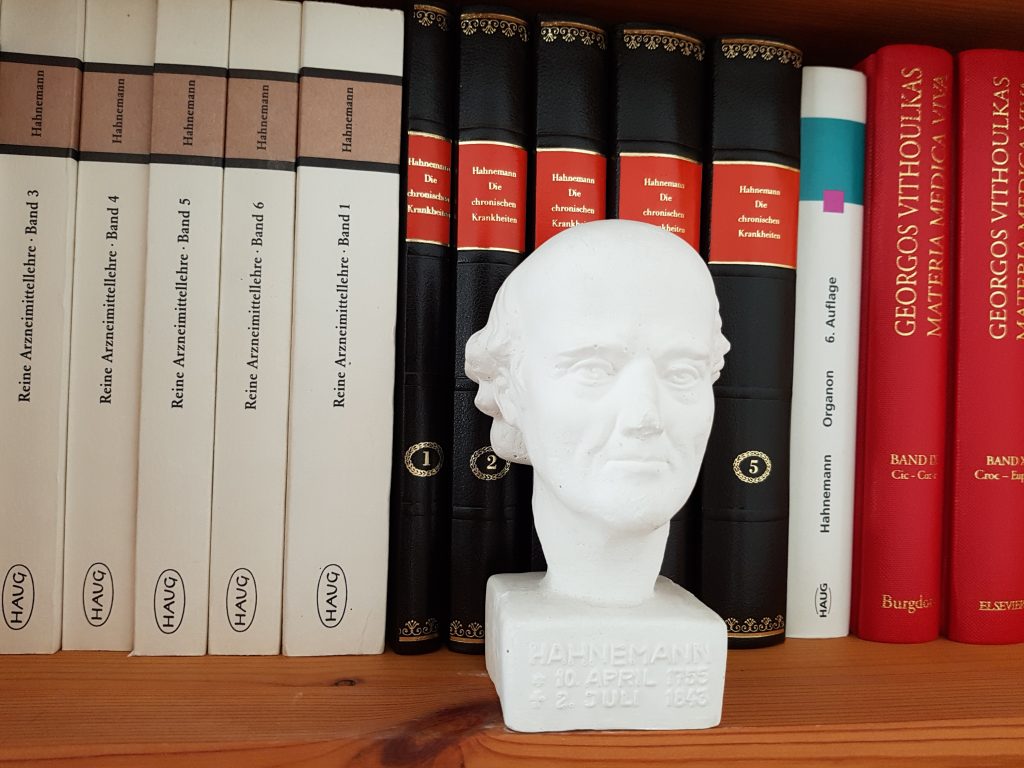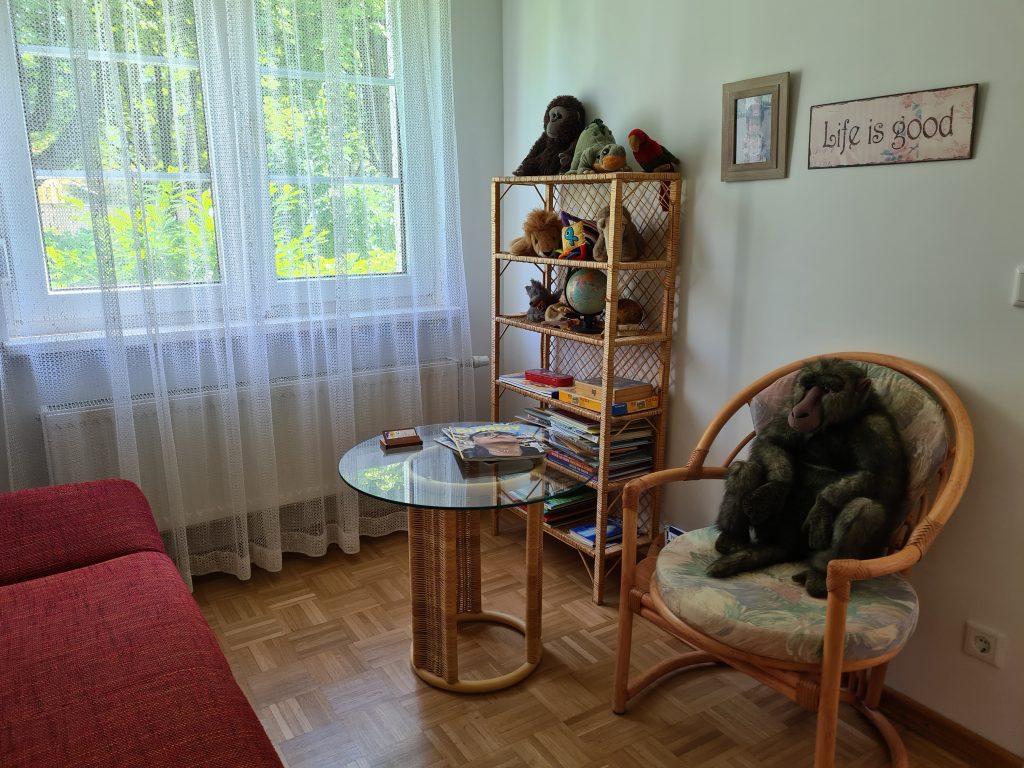What homeopathy is NOT: Homeopathy is not an herbal medicine and it does not only help with minor diseases. It also does not work slowly and you do not have to believe in it in order for it to work.
Homeopathy is a healing system based on the principle of similarity: something similar is cured with something similar.
That is, a substance that causes certain symptoms in a healthy person is able to cure a patient with similar symptoms.

The founder of homeopathy – German doctor Samuel Hahnemann (born 1775 in Meissen, died 1843 in Paris) – discovered this healing law in multiple experiments which he conducted on himself.
After this discovery his task was to examine various drugs and their effects.
Hahnemann and his disciples began testing many different substances of animal, mineral and plant origin. In doing so, they repeatedly found the same connections.
The characteristics of each disease found during the examinations were summarized in books (pharmacopeias) which serve as a reference book for the homeopath.
Hahnemann also developed a specific procedure in which the remedies were and still are prepared: The original substances are gradually diluted and shaken vigorously, which is called potentization in homeopathy. Through this method, e.g. toxic substances (such as arsenic or the deadly nightshade) completely exert their toxic effects and at the same time the beneficial effects of the various substances are significantly increased and last longer.
Homeopathy is a holistic medicine. It assumes that the whole person falls ill, not just individual parts of the body. An illness is seen as a disorder of the natural balance, one of self-regulation, expressed in certain specific symptoms. In the homeopathic treatment, body, mind and soul are equally considered and treated. The medicines naturally stimulate the organism to self-heal, to restore the disturbed harmony, to increase its resistance. Homoeopathic constitutional treatment is not just about eliminating your symptoms for a short time, but about making you less vulnerable to illness. Thus, this treatment method also also works preventatively.
Everyone needs their own remedy, specially tailored to them. It is quite possible that ten people with a sore throat come to a homeopath and each of them receives a different remedy. There is not a general remedy for sore throat, there is only one remedy for your sore throat. The therapist’s decision often depends on subtle differences that they try to establish throughout the conversation with the patient.
The homeopath then prescribes only individual remedies in targeted doses, which they have previously selected on the basis of the analysis of the individual disease according to the principle of similarity.
What is the homeopathic treatment?

The homeopath is not only interested in the physical, but also in all the noteworthy mental and emotional peculiarities. The goal is to put together a complete picture of the patient in the examination. The more the therapist knows, the sooner they can find the right remedy. The therapist must take in the information thoroughly and carefully evaluate it with the help of their books in order to prescribe the appropriate remedy. Today, special computer programs are also used that make this task much easier. Regardless, the knowledge and experience of the therapist remains crucial.
The homeopath must therefore ask you many different questions. Everything detail is important and meaningful. They are not only interested in your headache or rheumatism, but also in many other aspects of your life. It may be important to learn whether you are afraid of dogs, of the dark, of high places or crowds. Whether you are sad or irritable, what you are dreaming. If you have strong cravings for certain foods, how you sleep, how you respond to rain, sun, thunderstorms and weather changes, whether you are not a morning person or an early bird. Where you yourself suspect the reasons for your illness (grief, hypothermia, cold wind, bad news, etc.) to come from. What improves your discomfort or worsens it. Your homeopath is also interested in all the strange and unusual details that are characteristics of you or that you consider important.
The questions are not posed out of curiosity, but in order to be able to pick the right homeopathic remedy from the many possible ones. For the homeopath it is never about rating the patient or judging him by his good or bad qualities. Therefore, it is advised to not conceal anything, even if you find it embarrassing or strange. It could be important for your healing. The matters discussed with the homeopath are of course strictly confidential.
The first appointment (the so-called first anamnesis or “Erstanamnese” in German) lasts about 1.5-2 hours and the follow-up appointment for up to one hour. The intervals between appointments are usually about 4-6 weeks, but sometimes more or less, depending on the individual case.
Which diseases can be treated homeopathically?
Homeopathy is gentle, cost effective and able to restore health without harmful side effects. It is effective in the treatment of acute cases but also in treating rapidly increasing chronic diseases such as asthma, hay fever, atopic dermatitis, psoriasis, warts, susceptibility to infection, depression, anxiety, stuttering, bedwetting, chronic diarrhea, chronic constipation, migraines, irregularity, discomfort, menopause, psychosomatic illnesses and many others are also suitable for the treatment.
Even with the most serious diseases, such as cancer, multiple sclerosis, mental illness, etc.,it can often achieve a significant improvement and delay the course of the disease even though a complete cure is possible only in exceptional cases – mainly only if treatment begins at a very early stage of the disease.
Of course, homeopathy has its limits, for example, in regards to advanced organ damage, in life-threatening emergencies, in cases where surgical measures or substitution therapy is urgently needed and much more. But even in such cases, an accompanying homeopathic treatment can be beneficial.
How long does the homeopathic treatment take?

The duration of the treatment depends on many factors, but mostly on the responsiveness of the organism. Other important factors are age (children are usually faster than older patients in terms of response time), the duration of the disease, other medications you take, and whether you are under stress at home or at work. Hereditary factors play an important role as well.
Some cures may occur surprisingly quickly, but you should be patient in most cases, especially with chronic ailments, so do not stop the treatment prematurely. Even if you experience some preliminary positive result, let the therapy work long and deeply enough. Immediate miracles rarely happen.
What should I pay attention to during a homeopathic treatment?
Please closely observe your symptoms after taking the medication. Also, changes in energy, sleep, mood, dreams, etc. are very important for assessing the agent’s effect. In some cases (not always!) a so-called first aggravation of symptoms occurs. It usually goes away after a few days. Sometimes there is a temporary shift of symptoms (for example, asthma disappears and an old rash appears) or your old ailments reappear for a short time. From a homeopathic perspective, these are reactions that need not necessarily be treated immediately with the usual means. If in doubt, please call me, even if there is an acute illness during the constitutional treatment.
It is recommended to avoid coffee and substances containing camphor during homeopathic treatment because they can disturb or neutralize the effects of the agent. You should also not take any mixed “homeopathic” preparations.